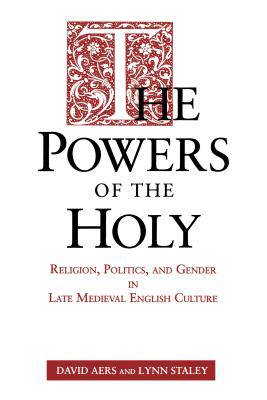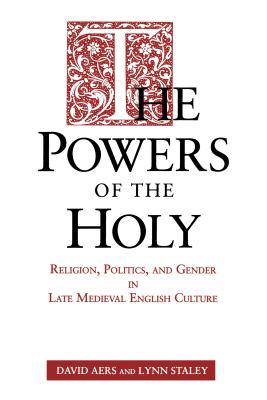
- Afhalen na 1 uur in een winkel met voorraad
- In januari gratis thuislevering in België
- Ruim aanbod met 7 miljoen producten
- Afhalen na 1 uur in een winkel met voorraad
- In januari gratis thuislevering in België
- Ruim aanbod met 7 miljoen producten
Omschrijving
The Powers of the Holy explores ways in which the language and images of Christian devotion in late fourteenth-century England were inextricably bound up with a variety of social and political relations. Addressing a wide range of texts, David Aers and Lynn Staley analyze the complex, shifting, and often extremely subtle forms in which writers responded to this situation.
Aers concentrates on representations of the humanity of Christ. He unfolds the spiritual and political implications of different versions of the humanity of Christ composed in this period, addressing major issues of gender and power introduced into the field by Caroline Walker Bynum and others. He considers conventional devotional texts, Wycliffite writings, Langland's Piers Plowman, and Julian of Norwich's Revelation. Staley focuses on Julian of Norwich and Geoffrey Chaucer, two very different minds working both within and against dominant conventions of representations and power. Though not usually paired, both writers signal their knowing participation in the contemporary debate about power and authority, a debate that was conducted using the language of sanctity.
The Powers of the Holy shows how and why medieval attempts to deal with an emerging crisis in the legitimization of authority (in most domains) interacted with conflicting versions of Christian sanctity. Simultaneously it shows just how, and why, matters that were distinctively spiritual could be politicized. Future readings of the period will undoubtedly follow this book's cultivation of methodologies that avoid any splitting apart of the study of devotion and devotional texts, the study of the politics of ecclesiastical and secular institutions, and the study of gender.
Specificaties
Betrokkenen
- Auteur(s):
- Uitgeverij:
Inhoud
- Aantal bladzijden:
- 320
- Taal:
- Engels
Eigenschappen
- Productcode (EAN):
- 9780271025933
- Verschijningsdatum:
- 15/09/1996
- Uitvoering:
- Paperback
- Formaat:
- Trade paperback (VS)
- Afmetingen:
- 152 mm x 229 mm
- Gewicht:
- 471 g

Alleen bij Standaard Boekhandel
Beoordelingen
We publiceren alleen reviews die voldoen aan de voorwaarden voor reviews. Bekijk onze voorwaarden voor reviews.









